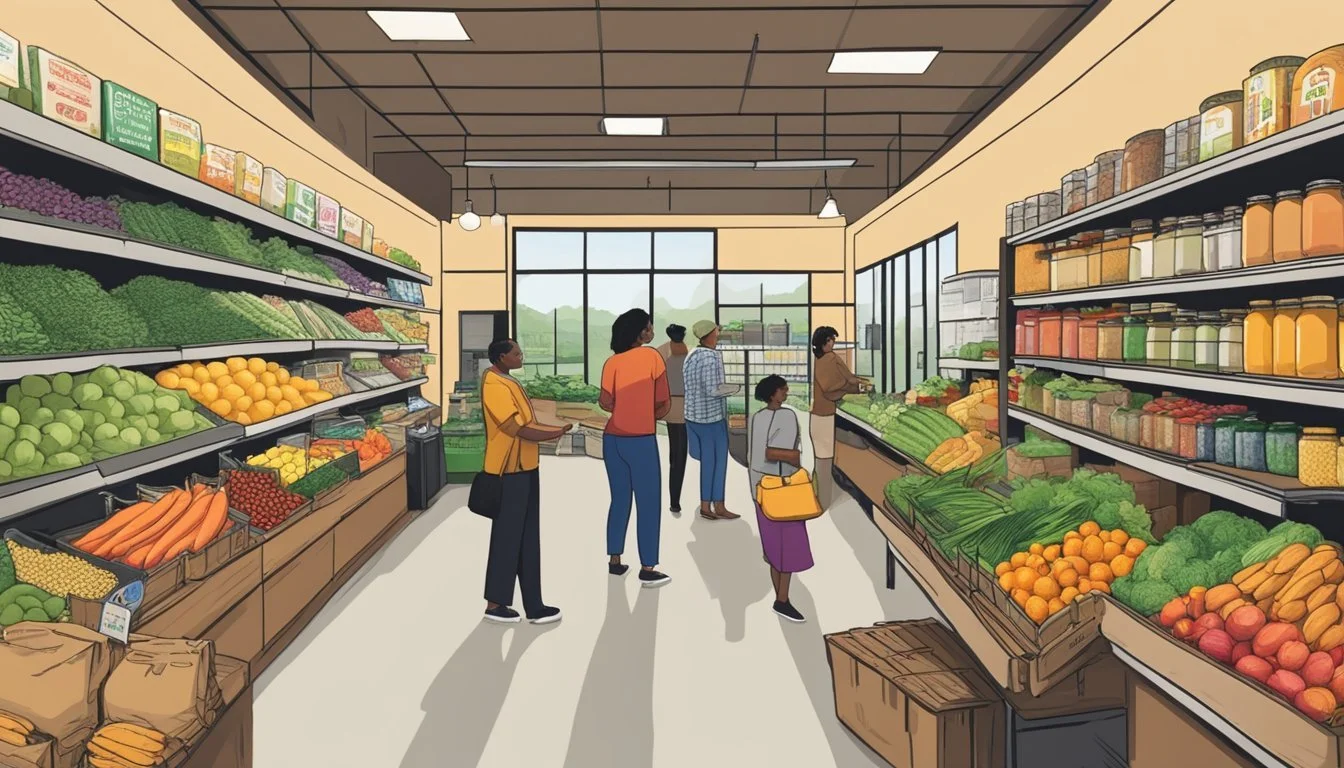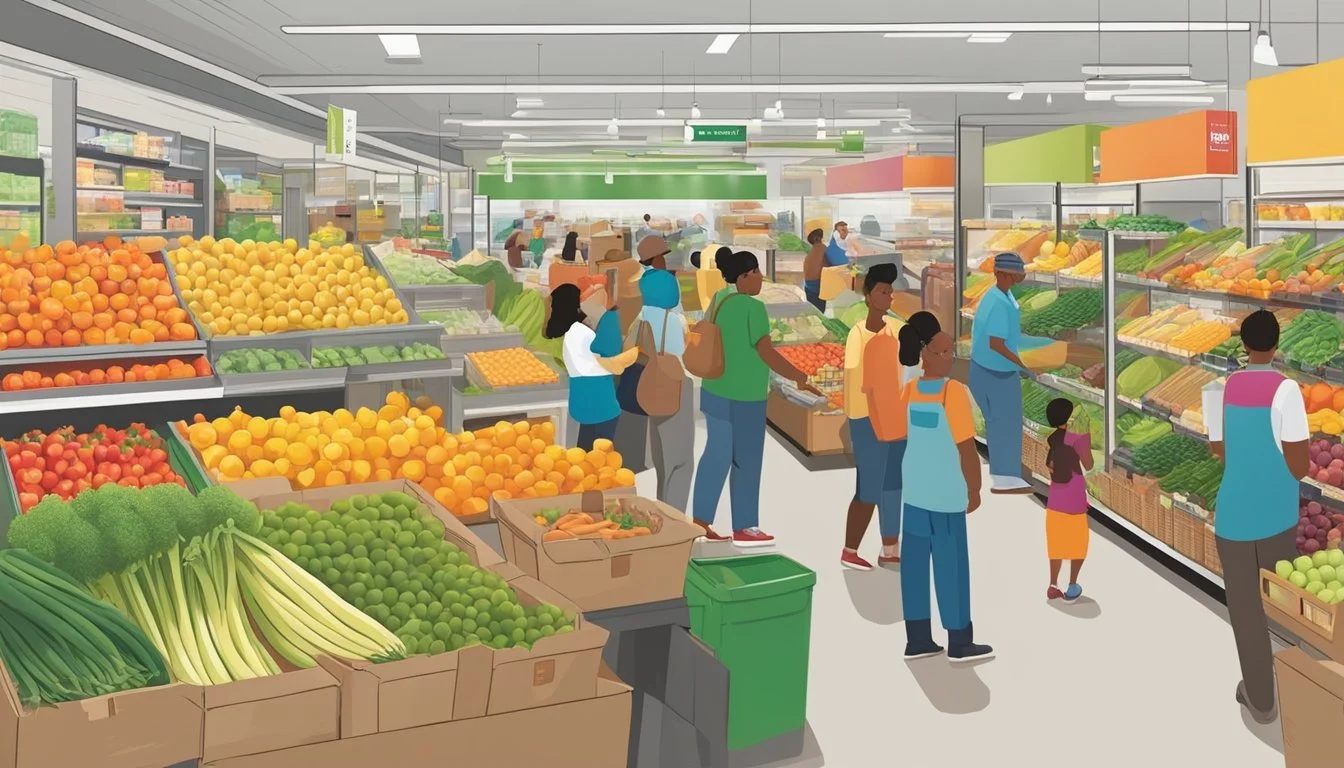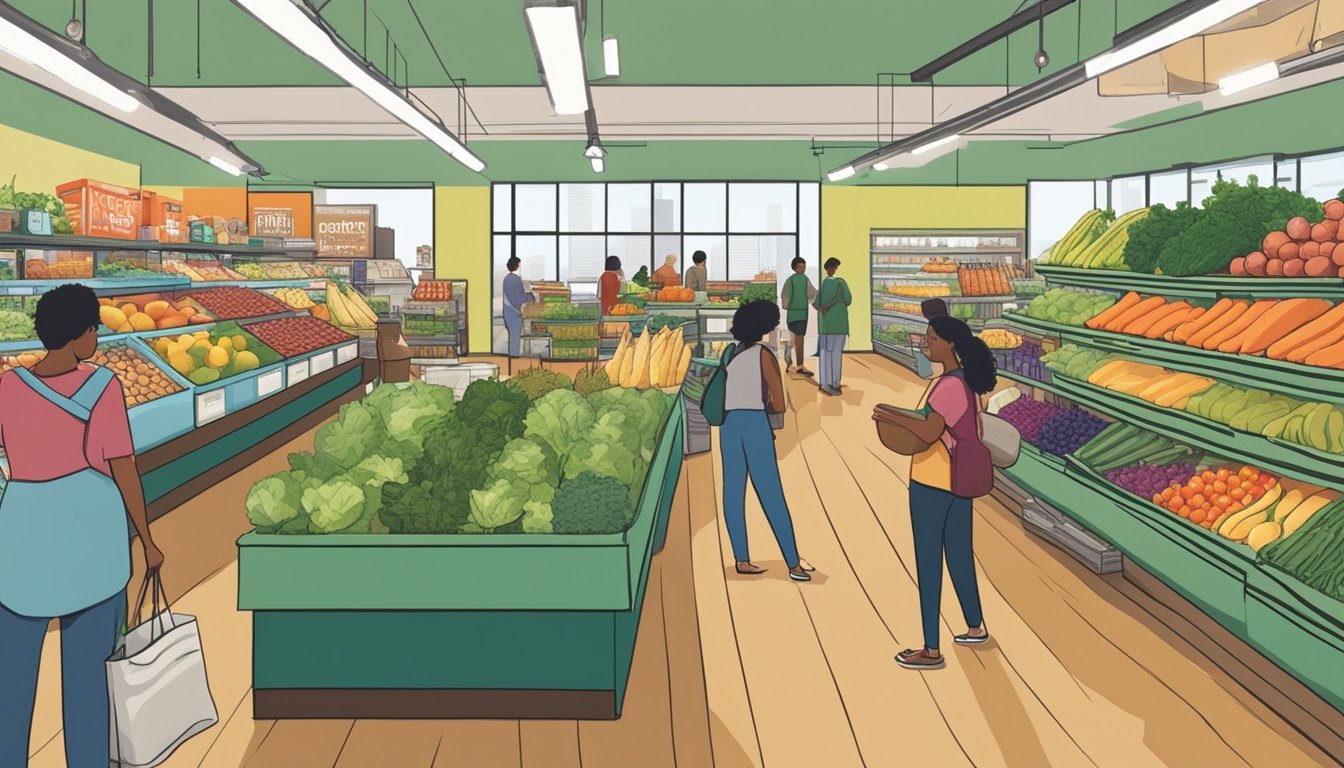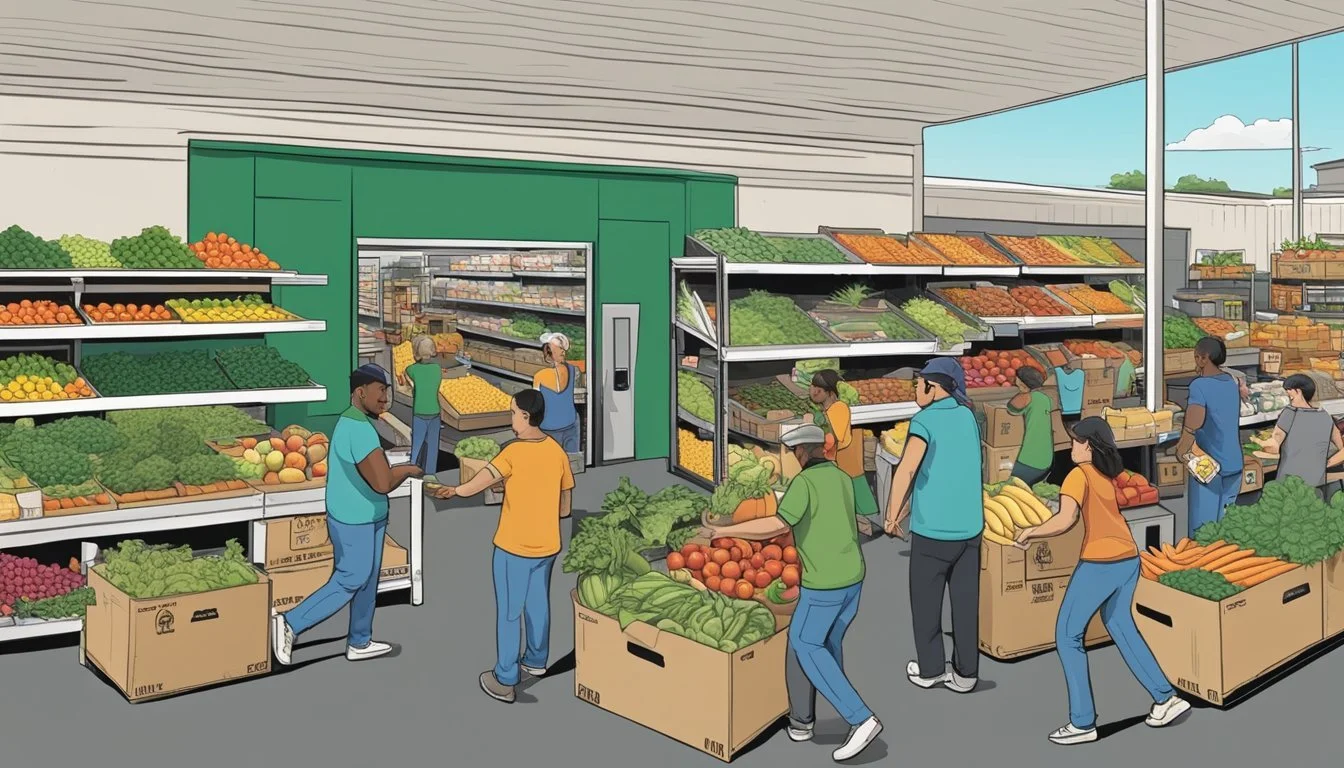Guide to Food Co-Ops in Houston, TX
Your Essential Source for Local Collaborative Shopping
Houston, Texas, stands as a vibrant hub for food cooperatives—often referred to as food co-ops—where community and sustainability merge in the realm of grocery shopping. These co-ops are member-owned businesses that operate for the benefit of their members and the local community, emphasizing the provision of local, organic, and sustainably raised farm products. Central City Co-op, Houston's oldest organic co-op, is one such example, indicative of the city's dedication to creating consumer-retailer relationships that value both the environment and quality of food.
The city's food co-ops operate with a strong ethos centered around supporting local farmers and producers, thus fostering a more equitable food system. They provide a direct link between consumers and their food, allowing Houstonians to invest in their health, their neighbors, and their local economy. Through organic options and partnerships with local vendors, these co-ops prioritize access to wholesome, nutritious options and often serve as educational resources for sustainable living.
Navigating the network of food co-ops in Houston reveals a diverse and expanding marketplace attuned to the needs of its patrons and the pulse of the city. These co-ops are testament to Houston's commitment to building resilient local food systems and offer a glimpse into the growing movement towards conscious consumerism in the urban context. Whether through weekly farmers markets or the everyday operations of brick-and-mortar stores, Houston's food co-ops are integral components of the city's vibrant food tapestry.
Understanding Food Co-Ops
In Houston, TX, food co-ops serve as essential hubs for sustainable, locally-sourced produce and products, offering members a unique model of food retail centered on community and shared benefits.
What Is a Co-Op?
A co-op, or cooperative, is a business model where the entity is owned and operated by its members. These members pool resources to achieve common goals related to the acquisition, distribution, and sale of food products. Food co-ops prioritize access to high-quality foods and often support local growers and producers. Members usually have a say in the operation of the co-op, making it a democratic approach to food retail.
Benefits of Joining a Food Co-Op
Members of food co-ops gain many advantages, including:
Access to fresh, locally-sourced food items, including organic produce, free-range eggs, and local dairy.
Shared decision-making power in the business's operations, enhancing the sense of community ownership.
Potential financial savings and benefits from pooling resources and purchases.
Educational opportunities regarding sustainable practices and healthy food choices.
How Food Co-Ops Strengthen Communities
Food co-ops are more than places to buy food; they are integral to fostering strong, resilient communities:
Supporting local economies: Co-ops often purchase directly from local farmers and producers, keeping money within the community.
Sustainable practices: By focusing on local, organic, and sustainable goods, co-ops help reduce the carbon footprint associated with long-distance food transportation.
Creating social hubs: Co-ops can become community centers where people meet, share ideas, and participate in events, strengthening community ties.
The Role of Local Produce
Local produce stands as a cornerstone of Houston's food co-ops, supporting sustainability and providing fresh options to the community.
Importance of Local Produce
Local produce refers to fruits, vegetables, and other food products grown within a geographically close area. Houston's food co-ops often focus on providing local, organic options, which not only reduces transportation emissions but supports the local economy. They typically carry a variety of vegetables, fruits, and herbs that are free from synthetic pesticides and fertilizers, making them a healthier choice for consumers. Additionally, seasonal offerings of local items such as tomatoes ensure that the food is at its peak for both flavor and nutritional content.
Seasonal Availability in Houston
Houston's climate allows for a broad range of seasonal produce available at food co-ops. Here's a snapshot of what to expect during different seasons:
Spring: Herbs, leafy greens
Summer: Tomatoes, peppers, melons
Fall: Squashes, root vegetables
Winter: Citrus fruits, winter greens
The co-ops' offerings tend to be aligned with what's available fresh and locally, meaning consumers get the freshest possible produce, picked at the peak of its ripeness. Co-op members can enjoy varieties of fresh organic produce that is less commonly seen in mainstream grocery stores, showcasing the rich agricultural diversity of the Houston area.
Membership and Participation
Food Co-Ops in Houston offer community members a chance to engage with local, sustainable food systems. Membership often entails both financial and participatory commitments, with a range of benefits including discounts and access to member-exclusive events.
How to Become a Member
To become a member of a Houston-based food co-op, an individual typically must fill out an application and pay an equity fee or purchase a share, which is sometimes refundable. Central City Co-Op, for instance, does not require membership for shopping, but becoming a member may offer additional benefits.
Member Responsibilities
Members of food co-operatives are often required to contribute a certain number of hours of service. This could involve volunteering in the store or participating in community events. The specific responsibilities vary by co-op, but they all aim to foster a sense of ownership and community involvement.
Discounts and Perks for Members
Members usually enjoy various discounts on products and may receive special perks like invitations to tasting events. Co-Ops like Central City Co-Op might offer members:
Discounts on fresh, local produce and other groceries.
Special Events: Access to workshops, tastings, and community gatherings.
Engagement in a food co-op as a member provides an opportunity to support sustainable agriculture and contribute to the wellbeing of the Houston community through service and participation.
Spotlight on Houston Food Co-Ops
Houston's food co-op scene offers a unique blend of locally-sourced, organic products and community-oriented shopping experiences. Leading the way is the Central City Co-Op, established by pioneers in the local food movement.
Central City Co-Op
Central City Co-Op stands out as Houston's oldest existing organic co-op, known for its sustainable practices and community-driven approach. Founded by Jennifer Georgantas and Patricia Greer, it provides a marketplace for locally-sourced, organic produce and goods. Patrons can enjoy the perks of shopping here without the need for a membership. The co-op boasts a positive reputation, with a 4.6 rating from 19 reviews noted for their passionate employees and volunteers beckoning customers to The Heights for fresh, organic options.
Location: The Heights, Houston, TX
Products: Fresh, organic produce and goods
Service: Welcoming both members and non-members
Rating: 4.6 (from 19 reviews)
Other Notable Co-Ops in the Area
Various other food co-ops and farm stands in the Houston area follow the ethos of organic and sustainable food sourcing. Season’s Harvest Cafe brings farm-to-table dining on over eight acres of land, while the uncompromising commitment of That Farm Stand On Highland Road in SantaFe offers produce grown exclusively using organic methods.
Season's Harvest Cafe
Type: Farm-to-table restaurant and cafe
Location: Cypress, TX
That Farm Stand On Highland Road
Type: Produce grown using organic methods
Location: SantaFe, TX
The co-op scene in Houston remains vibrant and essential, with Central City Co-Op leading the charge and other notable establishments contributing to a sustainable food economy for the local community.
Organic and Sustainable Choices
Houston's food co-ops present an important resource for consumers prioritizing health and environmental stewardship. They offer a selection of certified organic produce and support sustainable agricultural practices.
Certified Organic Products
Local co-ops like Central City Co-op carry a robust array of certified organic produce including organic fruits and vegetables. Products labeled as “certified organic” adhere to nationally established guidelines ensuring they are grown without synthetic pesticides and fertilizers.
Sustainable Agriculture Practices
Sustainable agriculture practices go beyond the scope of organic certification. They support methods that are not only safe for the environment but also help in maintaining soil health and biodiversity. Houston co-ops often source from farms that implement crop rotation, reduced tillage, and water conservation techniques to bring sustainably-grown produce to consumers.
Shopping at a Food Co-Op
When shopping at a food co-op in Houston, TX, customers can expect a community-driven marketplace that emphasizes organic and locally-sourced products, including meat, dairy, and bread. Shoppers have options to purchase in-store or order online with convenient pick-up services available.
How to Navigate the Co-Op Market
To effectively navigate a food co-op, shoppers should first acquaint themselves with the store's layout, which is typically organized by product category. Many co-ops operate on a membership basis, offering discounts and special deals to members, although non-members can also shop. It's beneficial to inquire about membership benefits and any volunteer opportunities, as many co-ops encourage community participation.
Store Sections:
Produce: Seasonal fruits and vegetables, often locally sourced.
Meat: Selections of grass-fed beef and other pastured meats.
Dairy: Includes raw milk and organic dairy products.
Bakery: Fresh bread and bakery items, possibly including gluten-free options.
Dry Goods: Organic pantry staples, such as grains, nuts, and spices.
Shoppers can also look out for labels and signs that provide information on the sourcing and farming practices, which is a cornerstone of the co-op's commitment to sustainability and health.
Product Range and Selection
Food co-ops in Houston are known for their impressive range of products that cater to health-conscious shoppers and those seeking organic options. They focus on:
Locally Sourced Goods: Emphasizing regional produce, meat, and dairy, supporting local farmers and producers.
Organic and Healthy Options: A vast array of organic dry products, fresh produce, and healthier alternatives.
Sustainable Practices: Products are often chosen based on their environmental footprint and ethical sourcing.
For those unable to visit in person, many co-ops offer an online market feature. Shoppers can:
Browse Online: Look through the available products online.
Order and Pick Up: Place an order and choose a convenient pick-up time.
The online market typically provides the same extensive selection found in the open market, ensuring that all customers have access to quality food items. With a focus on freshness and community support, food co-ops offer a unique, values-driven shopping experience.
Comparison With Regular Grocery Stores
In Houston, Texas, food co-ops present a unique shopping experience compared to regular grocery stores, especially in aspects of community involvement, quality of produce, and overall shopping ethos.
Food Co-Op Vs. Grocery Store Shopping
Food co-ops typically operate on a member-owned and -governed model, fostering a sense of community and ownership among shoppers. Members often have a say in the business operations, which is not the case in conventional grocery stores. Non-members can still shop at food co-ops, like Central City Co-Op, but they may miss out on certain benefits such as discounts or voting rights. Grocery stores, on the other hand, are usually owned by individuals or corporations with no direct consumer control.
Community Focus:
Food Co-ops: Aim to support local economies by selling local, sustainably raised products.
Regular Grocery Stores: Provide a wide assortment of goods, including international and national brands, with varying levels of community engagement.
Shopping Experience:
Food Co-ops: Encourage consumer education and community participation.
Regular Grocery Stores: Focus on convenience and variety, with less emphasis on educational outreach.
Price and Quality Considerations
When considering the balance between price and quality, food co-ops often prioritize high-quality, locally sourced produce, which can sometimes be more expensive than conventional grocery items due to sustainable farming practices. However, co-ops may offer competitive prices for members through buying clubs or bulk purchases.
Price:
Food Co-ops: Can offer affordable options for members through bulk purchases and buying clubs.
Regular Grocery Stores: Often have a range of price points, including budget and premium options, without a membership system.
Quality:
Food Co-ops: Focus on providing healthy, high-quality food, including organic and non-GMO options.
Regular Grocery Stores: Typically offer a variety of quality levels, ranging from generic brands to high-end organic products.
Food Co-Op Logistics
Houston's food co-ops offer a mix of pickup and delivery services, ensuring that members have flexible and convenient access to their grocery items. An essential feature of these co-ops is the efficient pre-ordering system that guarantees product availability.
Pick Up and Delivery Options
Most food co-ops in Houston provide pick up services for their members to collect their purchased goods at designated locations. For instance, Central City Co-op allows order pickups six days a week. Some co-ops also offer delivery services, though this may vary by location and availability.
Pick Up:
Designated locations and times
Weekly schedule for convenience
Delivery:
Availability based on location
Membership may be required
Pre-Ordering System
The pre-ordering system is an integral part of a food co-op's logistics, enabling members to place orders for products ahead of time. This is particularly important for ensuring access to fresh and seasonal produce.
Pre-Ordered Goods:
Ensures availability of seasonal items
Members can often order online
Service Benefits:
Streamlines inventory management
Enhances customer satisfaction
Co-ops like Central City Co-op encourage members to pre-order by a certain day, such as Tuesday, to pick up their orders starting from Wednesday. This service minimizes waste and ensures that the freshest products are provided.
Supporting the Local Economy
Food cooperatives in Houston, TX play a pivotal role in strengthening community ties and bolstering the local economy, particularly through the support of regional agriculture and food production.
Impact on Local Farmers and Producers
Local farmers and producers benefit directly from food co-ops like Central City Co-op, which prioritizes organic and local sustainably raised farm products. Such co-ops provide a dependable market for local produce, dairy, and meat, ensuring that the local agricultural community can sustain operations and growth. Not only does this aid in the economic stability of the farmers and producers themselves, but it also ensures the availability of locally produced delicacies for the community.
How Your Spending Helps
Every dollar spent at a food co-op has a multiplier effect:
Local Reinvestment: Money spent on local foods circulates within the Houston economy, leading to further investment in community initiatives.
Job Creation: Employment opportunities arise in local co-ops, supporting economies-of-scale for local producers to meet the co-op's demand.
Support for Local Dairy and Meat: Purchases from food co-ops often include products from local dairy and meat producers, keeping these sectors thriving.
Donations and Community Support: Many co-ops engage in community support through donations and educational programs, enhancing the communal fabric.
By choosing to shop at local co-ops, consumers amplify their impact on the local economy, all while nurturing Houston's community resilience.
Educational Resources and Community Events
Houston's food cooperatives serve not just as hubs for fresh, local produce, but also as centers for learning and community engagement. They specialize in education and service-oriented events that cater to a diverse membership.
Workshops and Cooking Classes
Local food co-ops, such as Central City Co-Op, often host workshops and cooking classes aimed at promoting sustainable living and enhancing culinary skills. These events are typically interactive, providing hands-on experience with organic ingredients. For example, wine and pasta tasting events may be held to celebrate cultural history months, encouraging both learning and communal participation.
Central City Co-Op: offers regular food-centric events that often coincide with significant cultural observances.
Community Meetings and Volunteering
Community meetings are pivotal for food co-ops as they offer a platform for members to voice opinions, learn about the co-op's operations, and participate in decision-making. Moreover, co-ops thrive on volunteering, and these venues are ideal for community members seeking involvement in local and sustainable food movements.
Volunteering Opportunities: Members can contribute to the co-op's mission by participating in various roles, from store operations to event organization.
Houston's co-ops leverage these events to not just feed the body, but also to enrich the soul and educate the mind, thereby fostering a robust community spirit centered around shared values of health, sustainability, and local empowerment.
Food Co-Op Success Stories
Food co-ops in Houston have established themselves as pivotal components of the community by focusing on local, sustainable agriculture and achieving remarkable feats in the industry.
Testimonials and Reviews
NuWaters Co-op
Local Support: Members describe NuWaters as a cornerstone of the community, lauding its focus on local and organic products.
Volunteer Commitment: Shoppers often highlight the dedication of volunteers, emphasizing the co-op's friendly and cooperative spirit.
Central City Co-op
Longevity and Trust: Celebrated as Houston's oldest organic co-op, Central City Co-op has garnered trust for its consistent supply of organic goods since 2001.
Customer Satisfaction: Reviews frequently commend Central City for its sustainably sourced produce and the positive impact it has on the local economy.
Notable Achievements in Houston
Community Impact
NuWaters Co-op operates in the historic Eldorado Ballroom building, contributing to the revival of the space while providing access to healthy food.
Central City Co-op was co-founded by Jennifer Georgantas and Patricia Greer, demonstrating leadership and initiative in the local food movement.
Sustainable Practices
Several Houston food co-ops have been instrumental in emphasizing the importance of regenerative agricultural practices by sourcing and offering seasonal, pastured, and raw food products to their members.
Your Role in the Future of Food Co-Ops
In Houston, TX, food co-ops rely on the proactive engagement and support of the community to thrive and grow. The participation of each member plays a pivotal role in shaping the future of these co-operative entities.
How to Contribute to Growth
To contribute to the growth of food co-ops, individuals can engage in various activities that bolster the co-op's presence in the local food economy. Firstly, becoming a member of a food co-op is a direct way to support growth; members' fees often provide the capital food co-ops need to flourish. Additionally, community members should consider advocating for the co-op model by sharing their positive experiences with others, hence promoting membership expansion.
Advocate: Share the co-op’s values and benefits with the community.
Invest: Purchase a membership or become a shareholder if the co-op offers equity options.
Participate: Attend co-op events and be part of decision-making processes.
Volunteering and Donations
Volunteering provides invaluable human resources to a food co-op, and donations can strengthen its financial stability. Both forms of support are essential for the food co-op's operations and strategic initiatives. Interested individuals could volunteer their time in various capacities, from working in the store to providing professional services pro bono.
Donating, whether it's money, local produce, or equipment, can have an immediate impact on a co-op's ability to serve the community:
Time: Assist with daily operations or offer skills for particular projects.
Resources: Donate products or equipment that can improve the co-op’s service quality.
Additional Products and Services
In addition to a wealth of fresh fruits and vegetables, Houston’s food co-ops offer an extensive range of other nutritious, sustainably produced goods. Dairy offerings, meats including specialty beef, and an array of spices and dry goods are just a glimpse of the variety these co-ops provide.
Beyond Produce: Dairy, Meat, and More
Shoppers looking for an alternative to conventional grocery stores will find Houston's food co-ops well-stocked with a diverse selection of dairy products such as raw milk, artisan cheeses, and yogurt. For meat lovers, the options are equally impressive - from pastured meats to Wagyu beef, known for its rich marbling and flavor. Central City Co-op, for instance, is known for its curated farm shares that offer a combination of sustainably raised meat and organic dairy products, inviting patrons to enjoy the freshest ingredients.
Dairy Options:
Raw milk
Artisan Cheese
Yogurt
Meat Selection:
Pastured meats
Wagyu beef
Assorted poultry
Specialty Items and Seasonal Offerings
Food co-ops in Houston don't stop at standard fare; they also provide a rotation of specialty and seasonal items that encourage culinary exploration and offer unique flavors. Shoppers can enhance their meals with a selection of spices, herbs, and seasonal fruit shares, bringing both nutrition and excitement to their tables. Seasonal offerings change regularly, reflecting the commitment of food co-ops to freshness and variety, while the availability of dry goods like grains and legumes rounds out the shopper's pantry with staple items.
Seasonal Offerings:
Fruit shares
Season-specific vegetables
Specialty and Dry Goods:
Spices and herbs
Heirloom grains
Beans and lentils
By maintaining a focus on local and sustainably produced options, Houston's food co-ops serve as hubs for community nourishment and food education.











